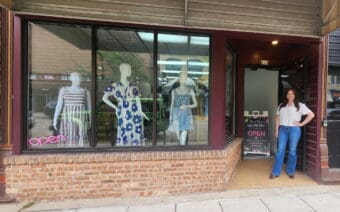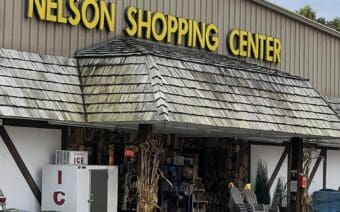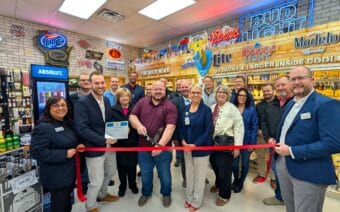
April 5, 2023
APPLETON – Combining a love for hunting and art, BenShot – a glassware design company – was born in a 300-square-foot garage in New London in 2015.
Eight years later, the company – now headquartered in Appleton – has grown into a worldwide player.
“If you see the American flag flying outside our building, that’s the same square footage of the size of the garage we began operations in,” Ben Wolfgram, co-owner of BenShot, said. “We’ve had a few different locations over the years, but we like the talent pool we have in the Fox Cities for employees.”
Wolfgram said there are currently about 40 employees working for BenShot.
A company born
Wolfgram said his parents – who are now retired – were artists and traveled the country selling their artwork.
“I was living in Philadelphia at the time, but my dad and I began brainstorming ideas of what we could work on together,” he said. “I grew up hunting, and with my dad’s artistic background, we came up with a bullet shot glass.”

Ben Wolfgram said the bullet shot glasses are the company’s best-seller. Photo Courtesy of BenShot
Wolfgram said they tested the idea at gun shows, and it started gaining traction. “From there, we thought it was a good idea to start incorporating more of people’s passions into the shot glasses,” he said.
Wolfgram said he and his father never dreamed BenShot would become as big as it’s become.
“This was truly supposed to be a side project for my dad and I to do on the weekends,” Wolfgram laughed. “From our little 300-square-foot garage, we’ll have more than 65,000 square feet of space this year.”
After getting its initial start in the tiny garage, Wolfgram said operations were moved to an old furniture factory in New London.
“By the first quarter in 2016, we moved into that facility,” he said. “More than 100 years ago, Thomas Edison owned the factory. Then we went to Royalton, and then Hortonville after that before settling in Appleton. We still own the Hortonville building and have two (buildings) in Appleton.”

BenShot co-owners Ben Wolfgram, left, and his father Bruce stand in front of the original workshop used to start the company in 2015. Photo Courtesy of BenShot
Wolfgram said he’s happy where BenShot is business-wise, but that doesn’t mean he doesn’t want the company to grow more.
“The natural tendency is for things to grow – even though we might not be pushing for that,” he said. “I want to make sure if we do grow, we keep that sense of community. We have an expansion going on, and that will be finished soon – it will allow us to be more efficient.”
Made in the USA
Wolfgram said from the start, it was their wish to have as much of the product made in the USA as possible.
“That’s important to us,” he said. “With our bullet glass, the glassware, bullet, the adhesive we use and the box (we package it in) are all made in the United States.”
With all other glasses, Wolfgram said BenShot does its best to use American-made products.
“An example where we can’t do that is with our Lego glass – Legos aren’t made in the United States,” he said.
Wolfgram said there’s not much to the story of why he and his dad wanted to keep things local – other than, “I feel it’s the right thing to do.”
“It feels dirty to send it overseas,” he said. “Having said that, I know why some companies do it – it’s a lot cheaper and easier… it would probably save us more than $1 million per year in payroll, and we wouldn’t have to invest in a large factory. The reasons why it’s important to keep as much as we can in the USA are the reasons why we’ve decided to keep things here.”
From a business standpoint, Wolfgram said there are big advantages to keeping things local.
“It shows we are here for the community – it keeps us agile and keeps the power here with us,” he said. “In the case of castings (which we use for many of our embedded products), that’s been around for a long time, but much of that knowledge is becoming lost because companies are sending work overseas to low-cost countries. Once the knowledge of a skill is lost, it’s gone forever.”
Wolfgram said casting is a manufacturing process where a liquid material is poured into a mold, which contains a hollow cavity of the desired shape, and then allowed to solidify.
The solidified part, he said, is also known as a casting, which is ejected or broken out of the mold to complete the process.
Wolfgram said BenShot gets product quotes from overseas “regularly.”

BenShot’s D20 (20-sided) die glass has been a popular new addition. Photo Courtesy of BenShot
“The quotes we get for the finished Chinese product are for less than what a single bullet costs us,” he said. “It’s not a difficult decision (to keep things local) for us, because it’s not under consideration… We have to get creative in the process to keep our costs low enough to make it affordable to customers.”
Wolfgram said BenShot is “basically the only company in the world who is doing this.”
“This year, we’ll do approximately 700,000 shot glasses,” he said. “Chinese companies are popping up, and then there are local glass blowers – that’s okay because that’s art.”
Wolfgram said he would consider BenShot a worldwide company, but most of the sales are in the U.S.
“I’d say, 98-99% of our business is state-side, but we do have distribution in South Africa, New Zealand, Australia, Europe, Asia and Japan,” he said.
Different options
Wolfgram said the bullet shot glass is the company’s best seller, but ones embedded with a golf ball are also popular.
“For me, the interesting part is where we can take the business,” he said. “We’re in the Smithsonian, we’re at the Pentagon and we’ve made glasses for the White House. Where can we take our small, Northeast Wisconsin mom-and-pop business next?”
Wolfgram said BenShot also has a lot of local customers who want unique glasses.
“We also partner with the Resch Center (in Green Bay),” he said. “When a performer comes, they’ll get a set of BenShot glasses – we’ll make them custom to what their interests are. They had The Avett Brothers come through, and they are big into ping pong, so we made ping pong glasses for them. It gives them something nice and unique that’s local to the area.”
Wolfgram said the process for each shot glass – from start to finish – takes about seven hours to complete.
“We start by buying divot-free glasses made in the USA,” he said. “We reshape the glass so we can use them. We also have different tools used to embed the different types of things.”

Employees at BenShot go through the process of making custom-designed shot glasses at the Appleton facility. Co-owner Ben Wolfgram said they take pride in making as much of the product in the USA as possible. Photo Courtesy of BenShot
A quick look at the website (BenShot.com) also shows BenShot embeds hockey pucks, fire axes, fishing lures, shotgun shells, broadheads, footballs, baseballs, cheese, guitar picks, propellers and dice.
“With what’s available on the website, you can probably find about 15 things we embed into glasses,” Wolfgram said. “The trick isn’t finding more things to embed, it’s thinking of the right thing to embed and having a market for it. We could think of 1,000 things to embed in an hour of brainstorming. Some of the things that sell well are surprising to me. The D20 (Dungeons & Dragons) die is one of those. We released our D20 and baseball glasses at the same time, and the D20 outsold the baseball 10-to-1.”
Giving back
Wolfgram said, to date, BenShot has donated to more than 800 nonprofit organizations nationwide, allowing the company to support military veterans, first responders, law enforcement officers and mental health causes.
“Giving back to our community is important to the team at BenShot,” he said. “We give back mostly with product donations. We probably have hundreds of organizations per month reach out to us. We give a lot back to the military, first responders and conservation communities.”
During the COVID-19 pandemic, Wolfgram said BenShot still made custom shot glasses at a limited capacity, but the company shifted gears somewhat.
“My brother is a doctor at Children’s Hospital in Milwaukee, and he told me they couldn’t get masks for the doctors and nurses, so they had to reuse them for longer periods,” he said. “I didn’t have a clue how to make masks, but they taught us how to sew them. We bought a bunch of sewing machines and bought fabric from Fox Cities Quilt Co. – we started making masks.”
Wolfgram said BenShot had probably 100 people sewing masks during COVID.
“We distributed to those who needed them,” he said. “In partnership with another nonprofit, we donated 450,000 hand-sewn masks – all for free. We didn’t charge for anything. The team at BenShot could have stayed home and collected full pay, but we had quite a few employees come to help us sew every day.”
Wolfgram said to help pay for the materials used and salaries, they marketed an “essential” v cglass.
“This was way before the term ‘essential’ was politicalized,” he said. “We sold those glasses all over the country and used the profits to buy the fabric locally, buy the machines and pay the salaries of the people working.”
 New North named Accredited Economic Development Organization by IEDC
New North named Accredited Economic Development Organization by IEDC Sargento Foods aims to make positive social impact every single day
Sargento Foods aims to make positive social impact every single day








